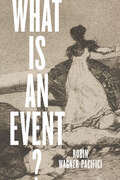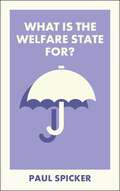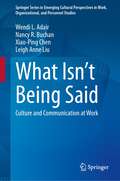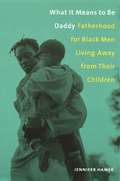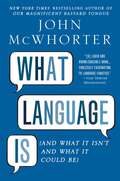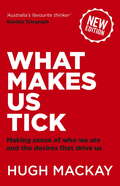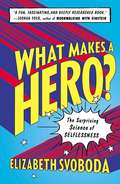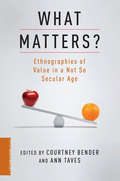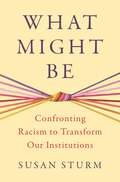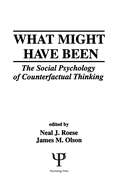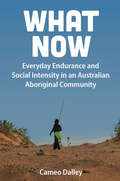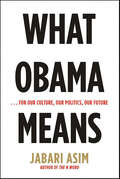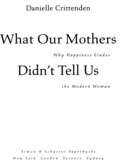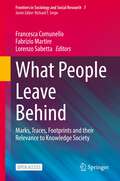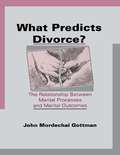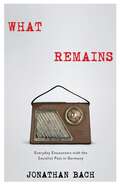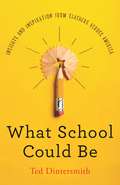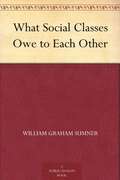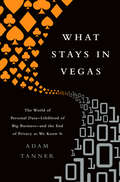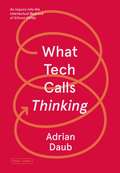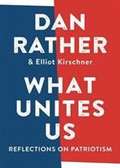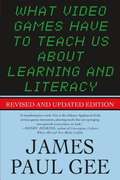- Table View
- List View
What Is an Event?
by Robin Wagner-PacificiWe live in a world of breaking news, where at almost any moment our everyday routine can be interrupted by a faraway event. Events are central to the way that individuals and societies experience life. Even life’s inevitable moments—birth, death, love, and war—are almost always a surprise. Inspired by the cataclysmic events of September 11, Robin Wagner-Pacifici presents here a tour de force, an analysis of how events erupt and take off from the ground of ongoing, everyday life, and how they then move across time and landscape. What Is an Event? ranges across several disciplines, systematically analyzing the ways that events emerge, take shape, gain momentum, flow, and even get bogged down. As an exploration of how events are constructed out of ruptures, it provides a mechanism for understanding eventful forms and flows, from the micro-level of individual life events to the macro-level of historical revolutions, contemporary terrorist attacks, and financial crises. Wagner-Pacifici takes a close look at a number of cases, both real and imagined, through the reports, personal narratives, paintings, iconic images, political posters, sculptures, and novels they generate and through which they live on. What is ultimately at stake for individuals and societies in events, Wagner-Pacifici argues, are identities, loyalties, social relationships, and our very experiences of time and space. What Is an Event? provides a way for us all—as social and political beings living through events, and as analysts reflecting upon them—to better understand what is at stake in the formations and flows of the events that mark and shape our lives.
What Is the Welfare State For? (What Is It For?)
by Paul SpickerMost states in the world make some provision for the welfare of their citizens. Every state engages with health care provision, almost all provide education services, and, after an explosion of interest in recent years, a substantial majority now have national schemes in place for cash assistance. Welfare states matter for people’s lives – but there is little agreement about what one is. What are these states trying to do, and why? The book discusses the institutions and methods that characterise welfare states around the world. It focuses on the aims, purposes and justifications for social welfare services in order to explain what the welfare state is for.
What Isn’t Being Said: Culture and Communication at Work (Springer Series in Emerging Cultural Perspectives in Work, Organizational, and Personnel Studies)
by Xiao-Ping Chen Leigh Anne Liu Wendi L. Adair Nancy R. BuchanThis book examines how exactly effective intercultural communication at work takes place. In order to do so, the authors take a deep dive into understanding the communication process and variation in communication patterns across cultures and individuals. They introduce a model that focuses on four sources of nonverbal communication, discuss existing research on intercultural communication in the workplace, and offer propositions for future research on the indirect, implicit, and nonverbal cues that can stymie cross-cultural communication effectiveness at work.
What It Means to Be Daddy: Fatherhood for Black Men Living Away from Their Children
by Jennifer HamerAbsent fathers, the breakdown of the nuclear family, and single-mother households are often blamed for the poor quality of life experienced by many African American children. Jennifer F. Hamer challenges both the imposition of an inappropriate value system and the resulting ineffectual social policies. Most of what we know about fathers who do not live with their children is based on interviews with the mothers; this book is based on interviews with the fathers themselves. How do these fathers perceive their roles and responsibilities? This myth-shattering book challenges stereotypes of negotiating parenthood within the context of poverty, live-away status, and black American manhood. Hamer has collected the voices of eighty-eight men who participated in this study by first examining the macro or cultural elements that encompass men's daily lives. As part 1 explores these larger forces that define the social world of fathers, part 2 looks at what significant others expect of men as fathers and how they behave under these circumstances. Part 3 analyzes the particular parenting roles and functions of fathers, using narratives of individual men to tell their own stories. In this book, contemporary black live-away fathers talk about their goals, walk us through their workplaces, allow us to meet their families and children, and enable us to view the world of parenthood through their eyes.
What Language Is: And What It Isn't and What It Could Be
by John McWhorterNew York Times bestselling author and renowned linguist, John McWhorter, explores the complicated and fascinating world of languages. From Standard English to Black English; obscure tongues only spoken by a few thousand people in the world to the big ones like Mandarin - What Language Is celebrates the history and curiosities of languages around the world and smashes our assumptions about "correct" grammar. An eye-opening tour for all language lovers, What Language Is offers a fascinating new perspective on the way humans communicate. From vanishing languages spoken by a few hundred people to major tongues like Chinese, with copious revelations about the hodgepodge nature of English, John McWhorter shows readers how to see and hear languages as a linguist does. Packed with Big Ideas about language alongside wonderful trivia, What Language Is explains how languages across the globe (the Queen's English and Surinam creoles alike) originate, evolve, multiply, and divide. Raising provocative questions about what qualifies as a language (so-called slang does have structured grammar), McWhorter also takes readers on a marvelous journey through time and place-from Persian to the languages of Sri Lanka- to deliver a feast of facts about the wonders of human linguistic expression.
What Makes Us Tick?: The Ten Desires That Drive Us
by Hugh Mackay'Hugh Mackay is one of this country?s most perceptive social commentators' - Sydney Morning HeraldInsightful and engaging, What Makes Us Tick? helps to explain what drives us, concerns us and is important to each of us ? from Australia's leading social researcher, Hugh Mackay. Dr Mackay has spent a lifetime listening to people talk about their dreams, fears, hopes, disappointments and passions. As well, his bestselling books have documented the impact of the changes that have been radically reshaping our society. In What Makes Us Tick? he reflects on some of the things that don't change, identifies ten desires that drive us all, and asks: 'Why do we talk as if we're rational, but act as if we're not?'; 'Why do some people always want to take control?'; 'Why do we seek change, yet resist it?'; 'Why do we want more of the things that have failed to satisfy us?'. His exploration of these and other issues goes to the heart of some of life's big questions.In this new edition Hugh Mackay offers a postscript that delves into the many concerns that were raised by people around the country when he was first promoting What Makes Us Tick?. They include: 'Why do people become workaholics?'; 'How can religious people hold such irrational beliefs?'; 'Why are so many people hooked on social media?'; 'What about gender and generational differences?'; 'Shouldn't our desire for security be on the list?', as well as many other issues that resonate with modern Australia. He also offers more thoughts on ? the desire to be taken seriously; the desire for 'my place'; the desire for something to believe in; the desire to connect; the desire to be useful. Raising all these ideas, this is a book that will explain us to ourselves. Hugh Mackay is a psychologist, social researcher and novelist, and is the author of the the bestselling Advance Australia... Where?
What Makes a Hero?: The Surprising Science of Selflessness
by Elizabeth SvobodaAn entertaining investigation into the biology and psychology of why we sacrifice for other people Researchers are now applying the lens of science to study heroism for the first time. How do biology, upbringing, and outside influences intersect to produce altruistic and heroic behavior? And how can we encourage this behavior in corporations, classrooms, and individuals? Using dozens of fascinating real-life examples, Elizabeth Svoboda explains how our genes compel us to do good for others, how going through suffering is linked to altruism, and how acting heroic can greatly improve your mental health. She also reveals the concrete things we can do to encourage our most heroic selves to step forward. It’s a common misconception that heroes are heroic just because they’re innately predisposed to be that way. Svoboda shows why it’s not simply a matter of biological hardwiring and how anyone can be a hero if they're committed to developing their heroic potential. .
What Matters?: Ethnographies of Value in a Not So Secular Age (A Columbia / SSRC Book)
by Ann Taves Courtney BenderOver the past decade, religious, secular, and spiritual distinctions have broken down, forcing scholars to rethink secularity and its relationship to society. Since classifying a person, activity, or experience as religious or otherwise is an important act of valuation, one that defines the characteristics of a group and its relation to others, scholars are struggling to recast these concepts in our increasingly ambiguous, pluralistic world.This collection considers religious and secular categories and what they mean to those who seek valuable, ethical lives. As they investigate how individuals and groups determine significance, set goals, and attribute meaning, contributors illustrate the ways in which religious, secular, and spiritual designations serve as markers of value. Reflecting on recent ethnographic and historical research, chapters explore contemporary psychical research and liberal American homeschooling; the work of nineteenth and early-twentieth-century American psychologists and French archaeologists; the role of contemporary humanitarian and volunteer organizations based in Europe and India; and the prevalence of highly mediated and spiritualized publics, from international psy-trance festivals to Ghanaian national political contexts. Contributors particularly focus on the role of ambivalence, attachment, and disaffection in the formation of religious, secular, and spiritual identities, resetting research on secular society and contemporary religious life while illuminating what matters in the lives of ordinary individuals.
What Might Be: Confronting Racism to Transform Our Institutions (Our Compelling Interests)
by Susan SturmHow to turn the paradoxes built into anti-racism work into drivers of learning and changeEven as anti-racism practices seemed to be gaining momentum, the nation shows signs of falling back into long-standing patterns of racial injustice and inequality. Leaders who introduce anti-racist approaches to their organizations often face backlash from white colleagues and skepticism from colleagues of color, leading to paralysis. In What Might Be, Susan Sturm explores how to navigate the contradictions built into our racialized history, relationships, and institutions. She offers strategies and stories for confronting racism within predominantly white institutions, describing how change agents can move beyond talk to build the architecture of full participation.Sturm argues that although we cannot avoid the contradictions built into efforts to confront racism, we can make them into engines of cross-racial reflection, bridge building, and institutional reimagination, rather than falling into a Groundhog Day–like trap of repeated failures. Drawing on her decades of experience researching and working with institutions to help them become more equitable and inclusive, Sturm identifies three persistent paradoxes inherent in anti-racism work. These are the paradox of racialized power, whereby anti-racism requires white people to lean into and yet step back from exercising power; the paradox of racial salience, which means that effective efforts must explicitly name and address race while also framing their goals in universal terms other than race; and the paradox of racialized institutions, which must drive anti-racism work while simultaneously being the target of it. Sturm shows how people and institutions can cultivate the capacity to straddle these contradictions, enabling those in different racial positions to discover their linked fate and become the catalysts for long-term change.The book includes thoughtful and critical responses from Goodwin Liu, Freeman Hrabowski, and Anurima Bhargava.
What Might Have Been: The Social Psychology of Counterfactual Thinking
by Neal J. Roese James M. OlsonWithin a few short years, research on counterfactual thinking has mushroomed, establishing itself as one of the signature domains within social psychology. Counterfactuals are thoughts of what might have been, of possible past outcomes that could have taken place. Counterfactuals and their implications for perceptions of time and causality have long fascinated philosophers, but only recently have social psychologists made them the focus of empirical inquiry. Following the publication of Kahneman and Tversky's seminal 1982 paper, a burgeoning literature has implicated counterfactual thinking in such diverse judgments as causation, blame, prediction, and suspicion; in such emotional experiences as regret, elation, disappointment and sympathy; and also in achievement, coping, and intergroup bias. But how do such thoughts come about? What are the mechanisms underlying their operation? How do their consequences benefit, or harm, the individual? When is their generation spontaneous and when is it strategic? This volume explores these and other numerous issues by assembling contributions from the most active researchers in this rapidly expanding subfield of social psychology. Each chapter provides an in-depth exploration of a particular conceptual facet of counterfactual thinking, reviewing previous work, describing ongoing, cutting-edge research, and offering novel theoretical analysis and synthesis. As the first edited volume to bring together the many threads of research and theory on counterfactual thinking, this book promises to be a source of insight and inspiration for years to come.
What Now: Everyday Endurance and Social Intensity in an Australian Aboriginal Community
by Cameo DalleyBased on extensive ethnographic fieldwork undertaken since 2006, the book addresses some of the most topical aspects of remote Aboriginal life in Australia. This includes the role of kinship and family, relationships to land and sea, and cross-cultural relations with non-Aboriginal residents. There is also extensive treatment of contemporary issues relating to alcohol consumption, violence, use of the internet and social media, and the impact of systemic ill health. This richly detailed portrayal provides a nuanced account of being and becoming on Mornington Island.
What Now: Everyday Endurance and Social Intensity in an Australian Aboriginal Community
by Cameo DalleyBased on extensive ethnographic fieldwork undertaken since 2006, the book addresses some of the most topical aspects of remote Aboriginal life in Australia. This includes the role of kinship and family, relationships to land and sea, and cross-cultural relations with non-Aboriginal residents. There is also extensive treatment of contemporary issues relating to alcohol consumption, violence and the impact of systemic ill health. This richly detailed portrayal provides a nuanced account of everyday endurance and social intensity on Mornington Island.
What Obama Means: . . . For Our Culture, Our Politics, Our Future
by Jabari Asim“Provocative and compelling.” —New York Newsday“Both entertaining and insightful.”—Washington Post Book World“It should be on the required reading list.” —Chicago Sun-TimesWhat Obama Means by Jabari Asim, renowned cultural critic and author of The N Word, is a timely and sharp analysis of how the “Obama phenomenon” exhibits progress in American politics and society. A frequent guest and commentator on “The Colbert Report,” “The Today Show,” NPR’s “Diane Rehm Show” and many other media programs, Asim also examines how cultural and political forces led to the watershed 2008 presidential election while indicating what the election means for every American.
What Our Mothers Didn’t Tell Us: Why Happiness Eludes the Modern Woman
by Danielle CrittendenTalk to women under forty today, and you will hear that something has gone terribly wrong with their lives. They have achieved goals previous generations of women could only dream of. Yet women feel more confused and more insecure than ever. Now one of the leading female commentators of her generation exposes the ideas that prevent modern women from finding happiness and points the way to a better future. What has gone wrong? What can be done to set it right? These are the questions Danielle Crittenden answers in What Our Mothers Didn't Tell Us. Crittenden is the founder and editor of The Women's Quarterly magazine. In only four years, Crittenden's Quarterly has made itself the center of a new national debate about women. Her views and writings have been cited, reprinted, argued, lauded, and criticized across the country. Mary Matalin describes the Quarterly as "one of my most favorite magazines on the planet. " George Will calls it "a bright light," and even Betty Friedan, with whom Crittenden has sparred, concedes that her views are on "the cutting edge. "In What Our Mothers Didn't Tell Us, Crittenden looks at the big topics in women's lives: sex, marriage, motherhood, work, aging, and politics. She argues that a generation of women has been misled: taught to blame men and pursue independence at all costs. Happiness is obtainable, Crittenden says, but only if women will free their minds from outdated feminist slogans and habits of behavior:There are a great many women unhappy because they acted upon the wisdom passed along to them by the people they most trusted. These women thought they did everything right only to have it turn out all wrong. That the wisdom they received was faulty, that it was based on false assumptions, is a hard lesson for anyone to learn. But it is a lesson every woman growing up today will have to learn as I, and thousands upon thousands of women of my generation, had to learn, often painfully. By drawing on her own experience and the decade she has spent researching and analyzing modern female life, Crittenden passionately and engagingly tackles the myths that keep women from realizing the happiness they deserve. And she introduces a new way of thinking about women's problems that may, finally, help women achieve the lives they desire. What Our Mothers Didn't Tell Us is sure to ignite debate not only across the country but, more compellingly, within the reader herself.
What People Leave Behind: Marks, Traces, Footprints and their Relevance to Knowledge Society (Frontiers in Sociology and Social Research #7)
by Francesca Comunello Fabrizio Martire Lorenzo SabettaThis open access book focuses on a particular but significant topic in the social sciences: the concepts of “footprint” and “trace”. It associates these concepts with hotly debated topics such as surveillance capitalism and knowledge society. The editors and authors discuss the concept footprints and traces as unintended by-products of other (differently focused and oriented) actions that remain empirically imprinted in virtual and real spaces. The volume therefore opens new scenarios for social theory and applied social research in asking what the stakes, risks and potential of this approach are. It systematically raises and addresses these questions within a consistent framework, bringing together a heterogeneous group of international social scientists. Given the multifaceted objectives involved in exploring footprints and traces, the volume discusses heuristic aspects and ethical dimensions, scientific analyses and political considerations, empirical perspectives and theoretical foundations. At the same time, it brings together perspectives from cultural analysis and social theory, communication and Internet studies, big-data informed research and computational social science. This innovative volume is of interest to a broad interdisciplinary readership: sociologists, communication researchers, Internet scholars, anthropologists, cognitive and behavioral scientists, historians, and epistemologists, among others.
What Predicts Divorce?: The Relationship Between Marital Processes and Marital Outcomes
by John Mordechai GottmanThis book details years of research involving questionnaires and observations of married couples in pursuit of the determinants of both marital happiness and divorce. It will be of interest to family and clinical psychologists and methodologists.
What Remains: Everyday Encounters with the Socialist Past in Germany
by Jonathan BachWhat happens when an entire modern state's material culture becomes abruptly obsolete? How do ordinary people encounter what remains? In this ethnography, Jonathan Bach examines the afterlife of East Germany following the fall of the Berlin Wall, as things and places from that vanished socialist past continue to circulate and shape the politics of memory.What Remains traces the unsettling effects of these unmoored artifacts on the German present, arguing for a rethinking of the role of the everyday as a site of reckoning with difficult pasts. Bach juxtaposes four sites where the stakes of the everyday appear: products commodified as nostalgia, amateur museums dedicated to collecting everyday life under socialism, the "people's palace" that captured the national imagination through its destruction, and the feared and fetishized Berlin Wall. Moving from the local, the intimate, and the small to the national, the impersonal, and the large, this book's interpenetrating chapters show the unexpected social and political force of the ordinary in the production of memory. What Remains offers a unique vantage point on the workings of the everyday in situations of radical discontinuity, contributing to new understandings of postsocialism and the intricate intersection of material remains and memory.
What Remains?: The Dialectical Identities of Eastern Germans
by Joyce Marie MushabenThis book tells the story of the German Democratic Republic from “the inside out,” using the lens of generational change to deconstruct an intriguing array of social identities that had little to do with the “official GDR” version authoritarian rulers regularly sought to impose on their citizens. The author compares the “identities” of five societal subgroups (GDR writers and intellectuals; pastors and dissidents; women; youth; and working-class men), exploring the policies defining their lives and status before/during/after the 1989 Wende, as well as the diverging “exit, voice and loyalty” dilemmas encountered by each. The “dialectical” components treated in this work center on the extent to which eastern identities were lost, found and reconfigured across three generations, from 1949 to 1989, from 1990 to 2005, then up to 2020. It explores how the existence of a separate East German state and the socialization processes imposed on each subculture has not only complicated the search for national unity since 1990 but also -- perhaps more controversially—invoked new challenges directly related to ongoing East-West structural disparities since unification and the treatment of eastern Germans by often more privileged western Germans.
What Role for Government?: Lessons from Policy Research
by Derek Leebaert Richard J. ZeckhauserThe vital debates on government today are concerned with its social role, its participation in the economy, and its redistributive responsibilities. These functions, not defined in the Constitution, reflect the evolution of society and its values and the powerful but jerky hand of the political process.
What School Could Be: Insights and Inspiration from Teachers across America
by Ted DintersmithAn inspiring account of ordinary teachers who are doing extraordinary things that could transform educationWhat School Could Be offers an inspiring vision of what our teachers and students can accomplish if trusted with the challenge of developing the skills and ways of thinking needed to thrive in a world of dizzying technological change.Innovation expert Ted Dintersmith took an unprecedented trip across America, visiting all fifty states in a single school year. He originally set out to raise awareness about the urgent need to reimagine education to prepare students for a world marked by innovation--but America's teachers one-upped him. All across the country, he met teachers in ordinary settings doing extraordinary things, creating innovative classrooms where children learn deeply and joyously as they gain purpose, agency, essential skillsets and mindsets, and real knowledge. Together, these new ways of teaching and learning offer a vision of what school could be—and a model for transforming schools throughout the United States and beyond. Better yet, teachers and parents don't have to wait for the revolution to come from above. They can readily implement small changes that can make a big difference.America's clock is ticking. Our archaic model of education trains our kids for a world that no longer exists, and accelerating advances in technology are eliminating millions of jobs. But the trailblazing of many American educators gives us reasons for hope.Capturing bold ideas from teachers and classrooms across America, What School Could Be provides a realistic and profoundly optimistic roadmap for creating cultures of innovation and real learning in all our schools.
What Social Classes Owe to Each Other (1883)
by William Graham SumnerWilliam Graham Sumner (October 30, 1840 - April 12, 1910) was a classical liberal (now a branch of ''libertarianism'' in American political philosophy) American social scientist. He taught social sciences at Yale, where he held the nation's first professorship in sociology. He was one of the most influential teachers at Yale or any major schools. <p><p>Sumner was a polymath with numerous books and essays on American history, economic history, political theory, sociology, and anthropology. He supported laissez-faire economics, free markets, and the gold standard. He adopted the term "ethnocentrism" to identify the roots of imperialism, which he strongly opposed. He was a spokesman against imperialism and in favor of the "forgotten man" of the middle class, a term he coined. He had a long-term influence on conservatism in the United States. <p><p>Sumner wrote an autobiographical sketch for the fourth of the histories of the Class of 1863 Yale College. In 1925, Rev. Harris E. Starr, class of 1910 Yale Department of Theology, published the first full length biography of Sumner. A second full length biography by Bruce Curtis was published in 1981. Other authors have included biographical information about Sumner as shown by citations in this "Biography" section. Sumner was born in Paterson, New Jersey, on October 30, 1840. His father, Thomas Sumner, was born in England and immigrated to the United States in 1836. His mother, Sarah Graham, was also born in England. She was brought to the United States in 1825 by her parents. Sumner's mother died when he was eight.
What Stays in Vegas: The World of Personal Data-Lifeblood of Big Business-and the End of Privacy as We Know It
by Adam TannerIn What Stays in Vegas, Reuters journalist and Harvard fellow Adam Tanner exposes the greatest threat to online privacy. It’s not the NSA, but private American firms. These are companies like Caesar's Entertainment in Las Vegas that operate behind the scenes, behind the tiny script of legal agreements, with little to no oversight. #147;This is the information age, and information is power!” screamed DocuSearch, "America’s Premier Resource for Private Investigator Searches & Lookups" in 1996--and they were right. Despite the fact that Caesar's casinos are decades old and can’t boast an array of singing gondoliers like the glitzy and glamorous Venetian, thousands of enthusiastic clients continue to pour through the ever-open doors of their hotels. The secret to the company’s success lies in their one unrivaled asset: Caesar’s Entertainment is able to track the activities of every hapless gambler that walks in. The company knows exactly what games he likes to play, what foods he enjoys for breakfast, for which holidays he prefers to visit Las Vegas, who his favorite hostess is and exactly how to keep him coming back for more. Caesar’s dogged data-gathering methods have been so successful that they’ve inspired companies from across industries to ramp up their own data mining in the hopes of boosting their targeted marketing efforts. Some do this themselves. Others rely on data brokers. And not all sit on the right side of the legal line. Even if you’ve never set foot in a casino or signed up for American Airlines’ frequent flier miles program#151;companies like Acxiom, Instant Checkmate, and People Smart that few have ever heard of, are still gathering information on you at every turn. Today, pretty much anyone has the power to publish revenge porn or slanderous gossip that will easily rise to the top of a simple Google name search. The reality is that we live in an age where our information is harvested and manipulated whether we like it or not. And it is growing ever more difficult for those businesses that choose not engage in questionable behavior to compete with those that do. Tanner’s ominous and timely warning resounds: no one is safe. With societal and legal boundaries on the use of personal data still largely undefined, the potential for abuse can be utterly disastrous. As to what stays in Vegas? The answer: almost nothing. . .
What Tech Calls Thinking: An Inquiry into the Intellectual Bedrock of Silicon Valley (FSG Originals x Logic)
by Adrian Daub"In Daub’s hands the founding concepts of Silicon Valley don’t make money; they fall apart." --The New York Times Book Review From FSGO x Logic: a Stanford professor's spirited dismantling of Silicon Valley's intellectual originsAdrian Daub’s What Tech Calls Thinking is a lively dismantling of the ideas that form the intellectual bedrock of Silicon Valley. Equally important to Silicon Valley’s world-altering innovation are the language and ideas it uses to explain and justify itself. And often, those fancy new ideas are simply old motifs playing dress-up in a hoodie. From the myth of dropping out to the war cry of “disruption,” Daub locates the Valley’s supposedly original, radical thinking in the ideas of Heidegger and Ayn Rand, the New Age Esalen Foundation in Big Sur, and American traditions from the tent revival to predestination. Written with verve and imagination, What Tech Calls Thinking is an intellectual refutation of Silicon Valley's ethos, pulling back the curtain on the self-aggrandizing myths the Valley tells about itself.FSG Originals × Logic dissects the way technology functions in everyday lives. The titans of Silicon Valley, for all their utopian imaginings, never really had our best interests at heart: recent threats to democracy, truth, privacy, and safety, as a result of tech’s reckless pursuit of progress, have shown as much. We present an alternate story, one that delights in capturing technology in all its contradictions and innovation, across borders and socioeconomic divisions, from history through the future, beyond platitudes and PR hype, and past doom and gloom. Our collaboration features four brief but provocative forays into the tech industry’s many worlds, and aspires to incite fresh conversations about technology focused on nuanced and accessible explorations of the emerging tools that reorganize and redefine life today.
What Unites Us: Reflections On Patriotism
by Dan Rather Elliot KirschnerAN INSTANT NEW YORK TIMES BESTSELLER "I find myself thinking deeply about what it means to love America, as I surely do. " --Dan Rather At a moment of crisis over our national identity, venerated journalist Dan Rather has emerged as a voice of reason and integrity, reflecting on--and writing passionately about--what it means to be an American. Now, with this collection of original essays, he reminds us of the principles upon which the United States was founded. Looking at the freedoms that define us, from the vote to the press; the values that have transformed us, from empathy to inclusion to service; the institutions that sustain us, such as public education; and the traits that helped form our young country, such as the audacity to take on daunting challenges in science and medicine, Rather brings to bear his decades of experience on the frontlines of the world's biggest stories. As a living witness to historical change, he offers up an intimate view of history, tracing where we have been in order to help us chart a way forward and heal our bitter divisions. With a fundamental sense of hope, What Unites Us is the book to inspire conversation and listening, and to remind us all how we are, finally, one.
What Video Games Have to Teach Us about Learning and Literacy
by James Paul GeeJames Paul Gee talks about his experience of learning and using video games. He looks at major specific cognitive activities - to develop a sense of identity, to grasp meanings, to pick a role model and to perceive the world.
